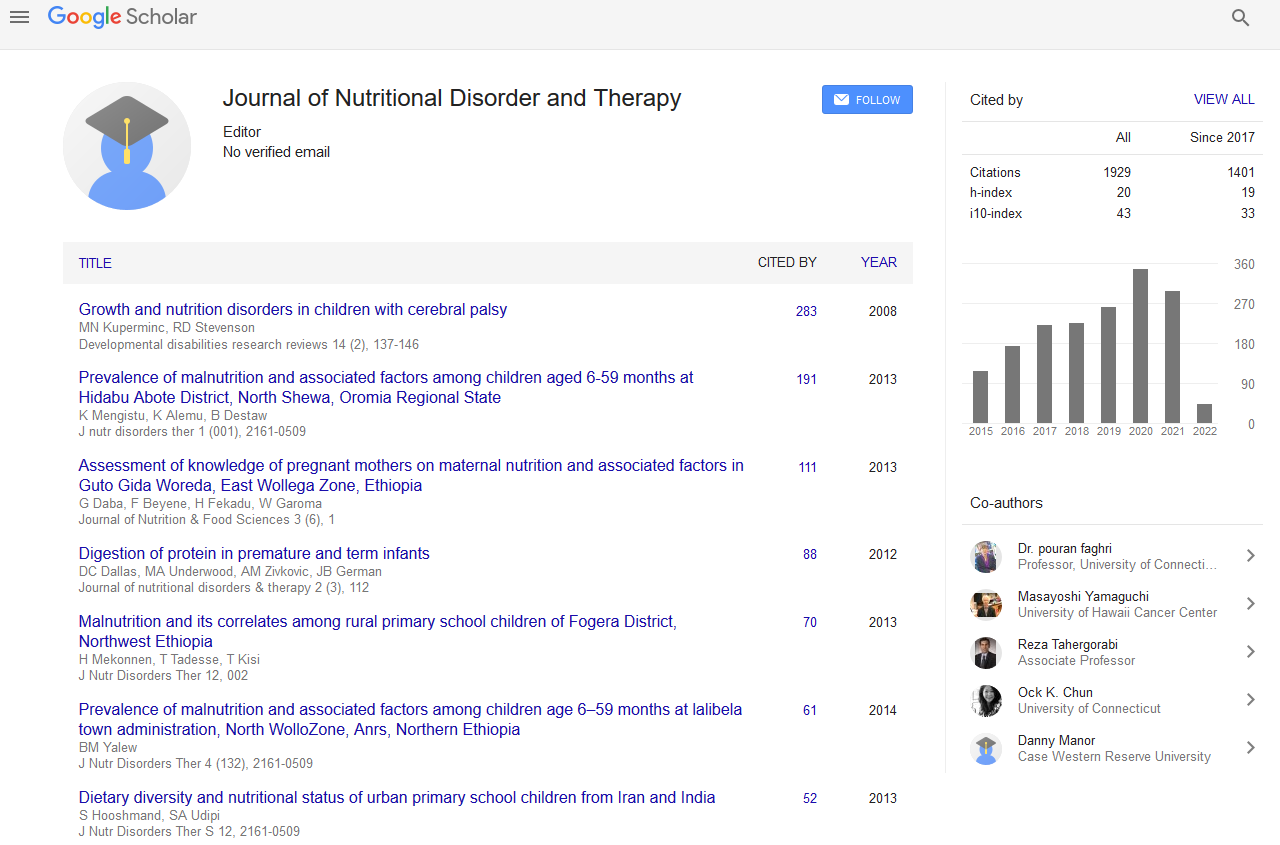Indexed In
- Open J Gate
- Genamics JournalSeek
- Academic Keys
- JournalTOCs
- Ulrich's Periodicals Directory
- RefSeek
- Hamdard University
- EBSCO A-Z
- OCLC- WorldCat
- Publons
- Geneva Foundation for Medical Education and Research
- Euro Pub
Useful Links
Share This Page
Journal Flyer

Open Access Journals
- Agri and Aquaculture
- Biochemistry
- Bioinformatics & Systems Biology
- Business & Management
- Chemistry
- Clinical Sciences
- Engineering
- Food & Nutrition
- General Science
- Genetics & Molecular Biology
- Immunology & Microbiology
- Medical Sciences
- Neuroscience & Psychology
- Nursing & Health Care
- Pharmaceutical Sciences
Assessment of nutritional status and dietary antioxidant capacity of patients wñth coronary artery disease: A pilot study
JOINT EVENT: 13th International Congress on Advances in Natural Medicines Nutraceuticals & Neurocognition & 14th International Conference on Clinical Nutrition
July 27-29, 2017 Rome, Italy
Neslihan Arslan and Gamze Akbulut
Gazi University, Turkey
Scientific Tracks Abstracts: J Nutr Disorders Ther
Abstract:
Diet and nutrition are among the most important factors in coronary artery disease. Many epidemiological studies have reported that antioxidant intake from diet is associated with a lower risk of coronary artery disease (CAD). This study was designed to assess the nutritional status and dietary antioxidant capacity of patients with CAD. The sample of study with 18 patients with angiographically documented CAD and 18 healthy controls was included into study from Atatürk Education and Research Hospital Ankara, Turkey. The ethical approval was taken from Zekai Tahir Burak Hospital from Turkey. A questionnaire regarding clinical, biochemical, dietary, family history, demographic and socioeconomic status was conducted by the researcher. Nutritional status was assessed by antropometric measurements and calculating Body Mass Index (BMI, kg/m2). The serum glucose, HDL-Cholesterol, LDL-Cholesterol, Total Cholesterol, Triglyceride, AST, ALT, Creatinine, Urea, Sodium and Potassium was obtained from the records of Cardiology Clinic of Atatu�?rk Education Research Hospital. The dietary intake was assessed by using 24-hour dietary recall method by the researcher. Dietary antioxidant capacity was calculated from an article which calculated the antioxidant capacity of 3100 foods. The results represented that mean age was 53.6±7.3 years in patient group, 51.9±8.31 years in control group. The mean body weight was 82.95±16.56 in patient group, 84.5±10.20 in control group. Although not statisticaly important the mean waist circumference, hip circumference, neck circumference and body mass index is higher in patient group than control group. The mean triglyceride was significantly higher in patient group than control group (p<0.01). The mean dietary antioxidant capacity did not differ between patient and control group. It is a negative correlation between coronary artery disease grade and dietary antioxidant capacity in patient group. Inverse association was observed between dietary antioxidant capacity and triglyceride levels in both groups. In conclusion, antioxidant intake is very important to minimize the effects of coronary artery disease. Both coronary artery disease patients and healthy individuals should be given importance to antioxidant intake in order to protect from both disease and their effects.
Biography :
Neslihan Arslan graduated from Yeditepe University. She started pursuing Master's degree at Gazi University. Her Master’s education is still ongoing and also works as a Research Assistant at Gazi University.


